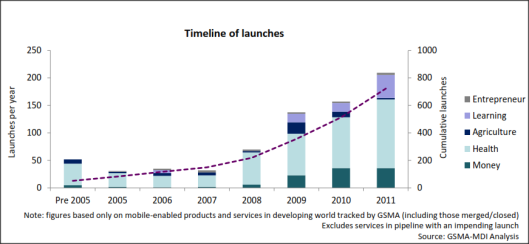Mobile for Development Intelligence (MDI) raises the sustainability question for M4D in their report Scaling Mobile for Development: A developing world opportunity. This is an important question and seems to be forgotten by many of the M4D enthusiasts.
Mobile access has been growing rapidly in Africa. Across the developing world, around 40% of people now actively subscribe to mobile services. Including those with access to a mobile despite not owning one would push the connected population to well over 50%. That is a market with huge opportunities for mobile operators and other service providers.
The entry point is the absence of reliable traditional services. Over 800 live services have been identified according to the report. These M4D services – mostly sms based – offer mobile alternatives in the areas of money, health, education and entrepreneurship.
According to the report, the problem is that while the sector has enjoyed continued growth in the number of services over the last 5-7 years, scale and sustainability have generally not been achieved.
The problems of scale and sustainability (technical and financial) are a well-known issues in the ICT4D world. In the early years of this century, when the possible applications of ICT for Africa were explored, many projects were started, but few became sustainable. Mike Gurstein illustrated this clearly for telecenters, but several academic papers have been published by Heeks and others.
Important lessons have been learned from poorly designed and implemented ICT4D projects:
- Design projects bottom up and collaborative.
- Monitor carefully how the tools/information in the project is used and adjust in a flexible manner.
- Build partnerships and do not re-invent the wheel.
The report clearly shows that this discussion needs to be started in the M4D world. Many of the M4D applications are built from the ground up on private vendor frameworks. The open frameworks are too little used. This hinders reuse and leads to duplication. Scale will not be reached, partnerships are limited and the implementation fails in the longer run.
It would be good to start to learn the lessons from ICT4D in order to avoid pitfalls and to provide good and useful M4D services for Africa. That they have future, that is clear, but only if well managed, these services will be able to provide reliable alternatives for failed traditional services.


Thanks for an interesting post, and I completely agree with the sentiment to learn the lessons from ICT4D. As one of the authors of the Scaling Mobile for Development report you cite here, I would be interested to hear from you about any specific examples/case studies of ICT4D projects that would be useful for practitioners in the M4D sphere to be aware of. Any suggestions?